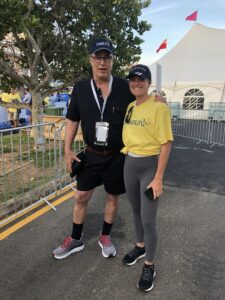Dr. William Douglas Bush Hiller, clinical professor at the Washington State University Elson S. Floyd College of Medicine, has spent much of his career working to ensure the health and safety of triathlon athletes.
This year, it’s taking the orthopedic surgeon at Whitman Hospital and Medical Center in Colfax to Tokyo where he will serve as the medical delegate for the Paralympics Para triathlon that will air Aug. 24 – Sept. 5.
Tokyo won’t be Hiller’s first Paralympics, or even his first Olympics, as a medical delegate for the United States. Hiller served in the same role at the Rio de Janeiro Paralympic triathlons in 2016 and as a medical official in the 2000, 2004 and 2008 Olympics, as well as a medical delegate for the 2004 and 2008 triathlons. His work pioneering the medical committee necessary for the Triathlon to become a full medal Olympic event in 2000 resulted in his induction into the International Triathlon Union Hall of Fame. He also serves as the vice chair for the World Triathlon Medical and Anti-Doping Committee, a research coordinator for the IRONMAN Triathlon World Championships, and as director of Labman Hawaii Inc., a 501(c)(3) nonprofit.
Though he has served as a medical delegate for some of the most elite triathlons in the world, the Paralympics triathlon remains Hiller’s favorite event.
“These athletes are world champions. They overcome so much more than the rest of us have to overcome. It’s become my favorite part of the sport,” Hiller said.
This year will be a different experience for Hiller, who will be heading into a bubble where he will undergo a series of COVID protocols including daily testing.

“Everything was open in Rio, Beijing, Athens and Sydney. Our biggest problems were protecting the race course and keeping people clear. But this time, we have to have a lot more protocols—ones for every possible outcome,” Hiller said.
During the Paralympics triathlon event, Hiller will oversee the entire race to ensure that athletes have everything they need when they need it, including coordinating ambulance locations and first aid stations. He will also monitor outdoor temperatures to assess the possibility of heat stroke and keep an eye on the water’s temperature and bacterial pathogens for the swim portion of the event.
Hiller’s work on triathlon safety doesn’t end in Tokyo and extends beyond race-day medical plans. As a specialist in endurance sports and an athlete himself, Hiller’s interest in the sport’s physiological effects began with the first Ironman race in 1978.
“I got hooked on the race. Then I got hooked on the physiology of the race,” Hiller said.
Hiller quickly identified a lack of modern studies on ultra-endurance exercise and formed a group of experts from disparate fields including exercise physiologists specializing in extreme environments, cardiologists, biophysicists and more, to study the physiological impacts of the sport.
“We sat around and made an exhaustive list of the failure modes of the human body,” said Hiller. “We wanted to rethink ‘what everybody knows,’ like that the heart doesn’t get tired or that salt is bad for you and your electrolytes didn’t change with exercise.”

These questions led to significant studies demonstrating cardiac fatigue and hyponatremia – a condition where individuals experience salt depletion – that have had a profound impact on how athletes not only train for ultra-endurance events but how medical professionals treat and respond to health issues during the event.
Once the International Federation of the Olympic Games was formed, Hiller wanted to make a difference on a global scale and helped start the Global Triathlon Safety Database. Housed at WSU under the direction of Hiller and Dr. Christopher Connolly of WSU’s Exercise Physiology & Performance Laboratory, the database allows for the tracking, complex analysis and dissemination of findings to the world triathlon community.
Connolly believes that the dataset offers incredible potential for triathlon organizations across the world to partner with researchers to develop a range of research initiatives.
“We want to create a pathway to make the sport safer,” said Connolly. “Ultimately, that optimizes performance. If less people are getting hurt, more people are able to reach their goals.
Medical students from the WSU College of Medicine are also engaged with the dataset as part of their scholarly projects, assessing trends in the dataset such as gender differences on diagnoses and treatment and changes in treatment over time.
WSU is also entrusted with the Kona Triathlon database and is currently working on partnering with other global triathlon organizations.

“WSU has a golden opportunity to be the focus of truly international world research in this area,” said Hiller. “Our collaborative research subjects are from all over the planet. We have access to literally a world of triathletes eager to contribute and learn.”
Though much of the dataset aggregates past data, Hiller and Connolly are looking ahead to new data, such as learning more about the impact of COVID-19 on athletes of different age groups among those who have had the virus and those who have been vaccinated.
“Physiology can make a difference, and everyone is different,” said Hiller.






